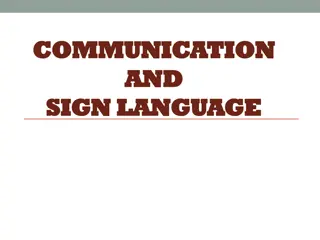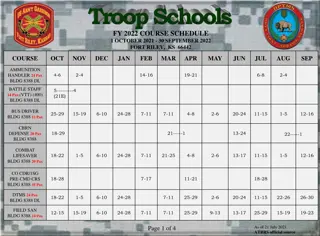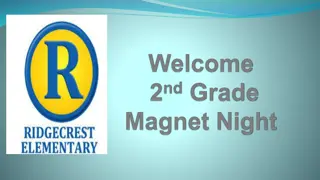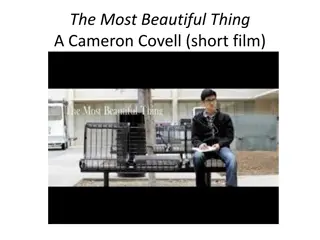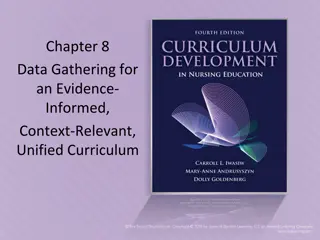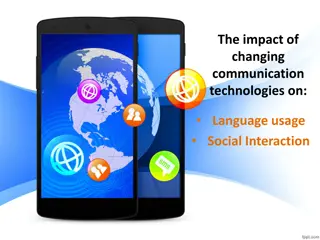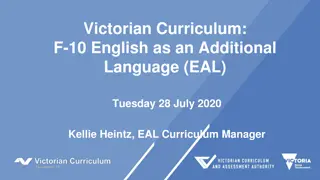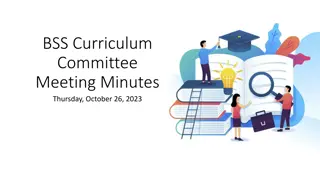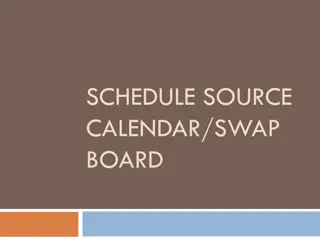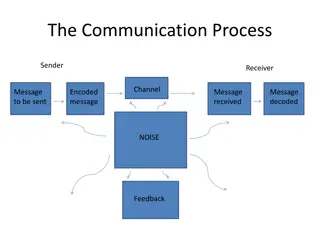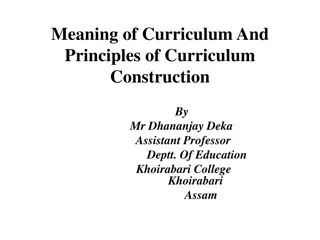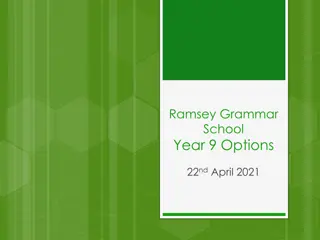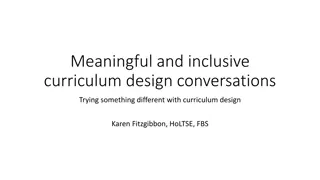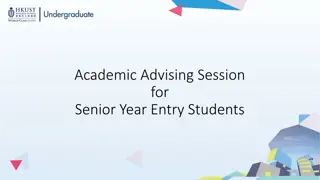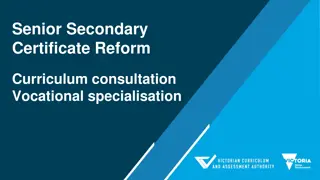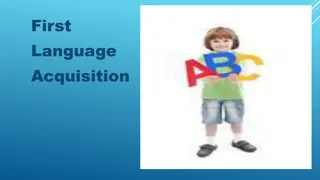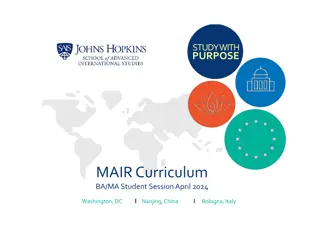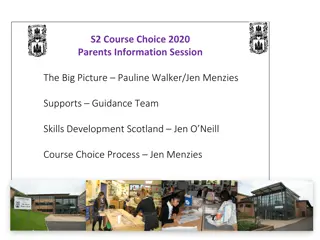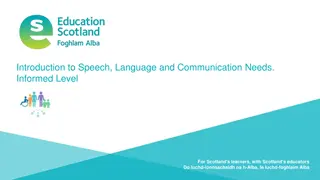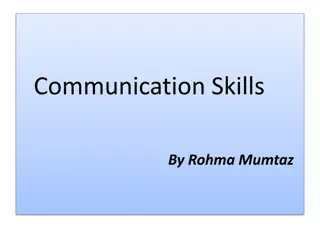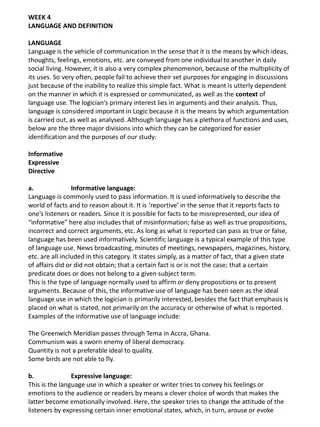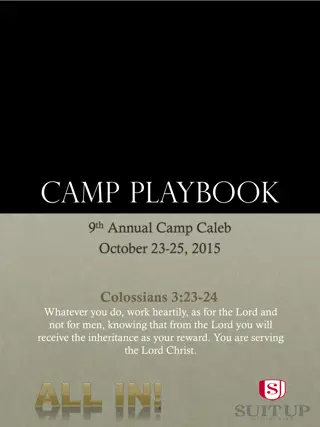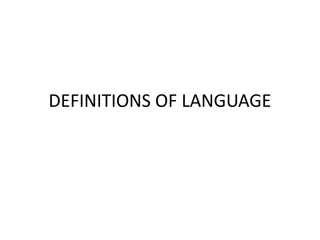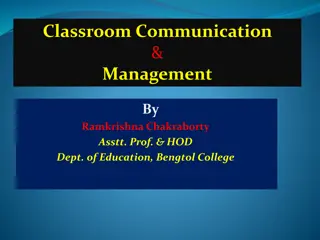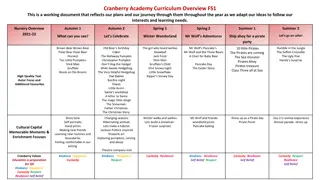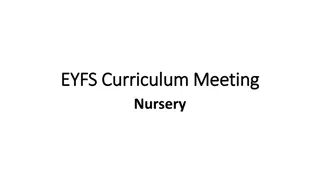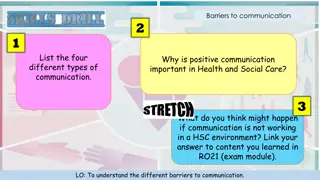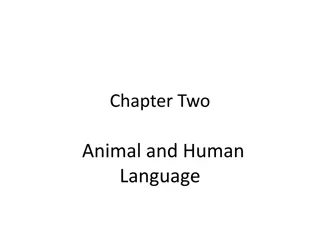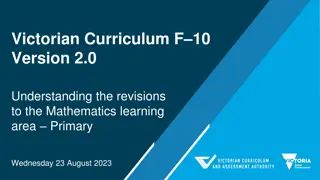Language and Communication Course Schedule and Curriculum Overview
In the academic year 2020/2021, the Faculty of Humanities offers a Language and Communication degree program. The course includes language skills development, focusing on listening, writing, reading, and speaking to reinforce B1 level proficiency. The curriculum involves expert-led language lessons with emphasis on various linguistic abilities. The schedule includes lecture dates from October to December, culminating in two exams - one written and one oral. The course website provides access to lecture materials, past exams, and other useful resources. Students can also find details about office hours and contact information for the faculty member in charge.
- Language and Communication
- Curriculum
- Faculty of Humanities
- Academic Year 2020/2021
- Linguistic Skills
Download Presentation

Please find below an Image/Link to download the presentation.
The content on the website is provided AS IS for your information and personal use only. It may not be sold, licensed, or shared on other websites without obtaining consent from the author. Download presentation by click this link. If you encounter any issues during the download, it is possible that the publisher has removed the file from their server.
E N D
Presentation Transcript
Facolt di Scienze Umanistiche CdL Lingua e Comunicazione Welcome a.a. 2020/2021
Luisanna Luisanna F Fo od dde Sit Sito o W We eb: b: http:/ http:// /p pe eo op ple.unic le.unica a. .i it/ t/l luis de uisa an nn na af fo od dd de e/ / o or rario ario di di ric rice evime vimen nto to - - LUNEDI LUNEDI 10 10- -12 (c/o 12 (c/o stu stud dio io 25 25 Camp Campu us s A Ar res esu u) ) - - by by a ap pp pointm ointme ent nt fodde@unica.it
Sito Web: http:/ http:// /p pe eo op ple.unic le.unica a. .i it/ t/l luis uisa an nn na af fo od dd de e/ / All interno del sito: Orario lezioni e ricevimento, avvisi Materiale didattico scaricabile relativo alle lezioni dell a.a. 2019/20: APPUNTI LEZIONI, PAST EXAMS, OTHER USEFUL LINKS & INFORMATION
Lingue e Comunicazione (I anno) ORARIO I SEMESTRE LUNEDI MARTEDI MERCOLEDI GIOVEDI VENERDI 10-15- 11.45 Fodde Aula Magna Fodde Aula Magna 10.15- 11.45 Pisci* (Webex 9) Smith** (Aula Webex 3) Pisci (Webex 2) Smith (Webex 3) **Gruppo Smith: da Meloni S. a Zahan *Gruppo Pisci: da Achenza a Melis Virginia
CALENDARIO DI MASSIMA TENTATIVE CALENDAR October2019 December 2019 (30 lezioni da 2 ore ciascuna): I Semestre: 15-16 lezioni Mercoled 21 e Gioved 22 ottobre; Mercoled 28 e Gioved 29 ottobre; Mercoled 4 e Gioved 5 novembre; Mercoled 11 e Gioved 12 novembre; Mercoled 18 e Gioved 19 novembre; Mercoled 25 e Gioved 26 novembre; Mercoled 2 e Gioved 3 dicembre; Mercoled 9 e Gioved 10 dicembre. PRE-ESAME FREQUENTANTI: Mercoled 16 dicembre (gennaio in alternativa)
IL CORSO I ANNO Il programmadelle lezioni di lingua tenute dagli esperti linguistici prevedono lo sviluppo delle 4 abilit linguistiche DI CONSOLIDAMENTO del livello B1 QCR: Listening: Ascolto e comprensione Writing: Use of English + Grammatica + Word formation + Sentence transformation Reading comprehension Speaking
LEsame Due prove, 1 scritta e 1 orale La prova scritta consiste in: Ascolto e comprensione (in lab) Use of English (verbs, question formation, vocab + linking words, ecc.) in lab/Webex Reading Comprehension (mc & open questions con esercizi, i.e sentence transformation + word formation + verbs)
LEsame (I anno) Due prove, 1 scritta e 1 orale La prova orale consiste in: Conversazione su argomenti generali Presentazione articolo con analisi Teoria linguistica
LE CERTIFICAZIONI Le certificazioni internazionali di lingua inglese (a partire dal livello B1 PER IL I ANNO E B2 PER IL II ANO del QCR) e gli attestati di frequenza e profitto rilasciati dal Centro Linguistico di Ateneo a partire dal livello Avv. B2), potranno essere sostituzione di parte o intera prova scritta. * presentate per la SE CONSEGUITE IN PERIODO NON SUPERIORE AI 3 ANNI * Cfr documento sulle certificazioni SITO WEB DOCENTE
LE CERTIFICAZIONI CAMBRIDGE ESOL, TRINITY ISE 6, IELTS, TOEFL , PEARSON ACADEMIC +CLA (frequenza + profitto) Cfr . Documento sulle certificazioni pubblicato sul sito
LEsame INGLESE (PER IL I ANNO) PARTE I La prova orale: Lettura e commento in inglese di un articolo di almeno 500 parole. L articolo deve essere pubblicato negli ultimi sei mesi (rispetto alla data dell esame) e tratto da uno dei seguenti giornali: Newsweek, Geographic, Life, The Economist, The International Herald Tribune, The Times, The Guardian, The Telegraph, The Independent (consegnare 2 copie alla commissione esame al momento della prova); Time, National Colloquio in lingua inglese sulla teoria linguistica
Libri di testo e materiale didattico INGLESEparte 1 Testi di Riferimento: Crystal D. The Cambridge Enciclopedia of the English Language (Chapters14-15-16; 17-18) (CUP1995). L. Pinnavaia, Introduzione alla Linguistica Inglese, Roma: Carocci2015 (nuova edizione) (Estratti); G. Nelson. English an Essential Grammar. London: Routledge 2011 (2nd edition) (Estratti); Slide/dispense fornite dal docente. Other materials will be provided during the lessons.
Esercitazioni in aula e laboratorio Course book: I ANNO ENGLISHFILE INTERMEDIATEFOURTHEDITIONDIGITAL Student's book& workbook (with key) LISTENING,GRAMMAR, VOCABULARY ,USE OF ENGLISH, WORD FORMATION. WE TEST THE LEVEL NOT THE BOOK!!!!!!!!!!!!!!!!!! - Strategie di ascolto e comprensione - Presentazione argomenti specifici della parte teorica
Listening comprehension exercise SIX MINUTE ENGLISH (BBC.CO.UK) http://www.bbc.co.uk/worldservice/learningenglish /general/sixminute/
University Language Centre Centro de Idiomas- Sprachenzentrum - Centre des langues trang res- Centro de l nguas - http://cla.unica.it/index.php MEETING OTHER STUDENTS - is based on the idea that the best way to learn a language, is to practise it. It provides a platform for university students to meet with native speakers from all around the world to improve their skills and in return teach someone else your own native language.
Alcuni suggerimenti 1) 2) Se non si frequenta, contattare docente per email (Rispondosempre e subito) Se si frequenta ma si hannodei dubbi,le voci di corridoio non hanno fondamento: a) Bloccare il docente prima o dopola lezione b) Scrivere un messaggio email (Rispondo sempre e subito) Presentarsi (cognome,matricola, CdL [= Corso di Laurea], CURRICULUM) Non scrivere stupidaggini a) Ho visto che on-line ha indicato che per l orale bisogna portare 1 articolo di 500 parole. Pu confermarmelo? b) Ho visto che i testi in programma sono 2. Mi pu indicare quali sono I contenuti che ritiene fondamentali per l esame/pagine devo studiare per l esame/quali argomenti chiede maggiormente all esame? c) Ho visto che i testi in programma sono 2. Devo farli tutti e due? d) Mi pu confermare che il programma on-line quello che devo portare all esame? Non contattare la docente 5 giorni prima dell esame, o 4, 3, 2, 1 .per avere informazioni sull esame 3) 4) 5)
-----Messaggio originale----- Da: Crazy Enemy MC [mailto:jissendo11@gmail.com] Inviato: gioved 13 settembre 2018 12:37 A: Fodde@unica.it Oggetto: Visone Compito Lingua Inglese Salve, vorrei visionare il test di inglese, quando sarebbe possibile? Inviato dal mio dispositivo mobile Huawei
LA FREQUENZA ALLE LEZIONI Le lezioni con la sottoscritta e le esercitazioni con i docenti madrelingua saranno monitorate attraverso la raccolta di firme, a partire dalla seconda lezione. Questo consentir a coloro che avranno una buona percentuale di presenze (65%) di poter usufruire di alcune opportunit . PER LE ESERCITAZIONI: Possibilit di svolgere una prova scritta ESONERANTE!!! PERIODO: FINE febbraio PER LE LEZIONI: Possibilit di sostenere la prova SCRITTA ESONERANTE di teoria linguistica A DICEMBRE.
The English language in 2020 The world population is today 6 bn English has official or special status in at least 75 countries, with a total population of 1.75 million; one out of four of the world's population speak English to some level of competence; demand from the other three quarters is increasing; It s spoken as a secondlanguage by 38% of adults , trailed distantly by French (12%) and German (11%); This dominance is set to grow dramatically, with 94% of secondarystudents in Europe learning English as a foreign language; The use of English throughout Asia, the Commonwealth, and North America, plus the widespreaduse of English online and in the media, all encourage English as the ongoing second language of choice.
The English language in 2019 What is the role of English in Italy? How do you use English or plan on using it in the future?
ELF AND EFL??? ELF (ENGLISH AS A LINGUA FRANCA) is defined as the language of communication between people whose native language IS NOT ENGLISH. So their needs are quite different to students who go to the UK, for example, and want to integrate within that culture and so may want to sound as much like a native speaker as possible (EFL - ENGLISH AS A FOREIGN LANGUAGE) The priority for students using ELF , on the other hand, is to be as intelligible as possible to the people they are communicating with. This does not necessarily mean sounding like a native speaker .
Global English- English as a Lingua Franca (ELF) - Data about the pronunciation features which caused the most communication breakdown communication (Jenkins 2000) - Pronunciation priorities in an ELF context: 1) Most consonant sounds are necessary (but no distinction / / as in the th in mother , / / as in the th in thumb ) 2)Appropriate consonant cluster simplification (HELP-ED) in international 3) 4)Nuclear stress (i.e. on the syllable that carries maximum prominence: MANAGEMENT , the nuclear syllable is the first one) Vowel length distinctions (i.e. /i:/ vs /i/)
LINGUA FRANCA CORE (LFC) The language of non-native speakers HAS NOW BECOME the language of international communication WHAT ARE THE CONSEQUENCES OF THIS? - Vocabulary - Pronunciation - Grammar The English we teach and learn is changing. Certain pronunciations and errors will be accepted WE MUST BE MORE TOLERANT AND ACCEPT DIVERSITY AND LOOK AT THE DIFFERENT SITUATIONS OF ENGLISH USE
EFL AND ELF EFL, ELF , etc. are just different contexts of using English; i.e. the different roles that English plays depend on who is speaking to whom, rather than where English is being used. One is not inherently better or more appropriate than another they re just different things. What learners need/want to learn will depend on the context in which they (want to) use English.
AFTER BREXIT? A DISTINCT VARIETY? In a paper published in the journal World Englishes recently, linguist Marko Modiano speculates about what this is likely to mean for the future of English in Europe. He argues that the newfound neutrality of English is likely to help it survive Brexit and that without the UK s clout in Europe, European English will be free to do what language does best: change.
AFTER BREXIT? A DISTINCT VARIETY? Without the UK s 60 million native English speakers, the five million native speakers from Ireland and Malta will make up only 1% of the total EU population. This will leave almost everyone else who speaks English in Europe on an equal footing, all using their second language to communicate. Even setting aside the question of official status, the daily use of English throughout the continent is unlikely to be diminished. Many countries have invested heavily in learning English, so regardless of official status, expedience is likely to win out: an Italian and a Dane conducting business are still more likely to resort to English than any other language.
AFTER BREXIT? A DISTINCT VARIETY? The major change, argues Modiano, is that the UK will no longer have a say in how English is used. This will leave European English free to drift towards US or Commonwealth conventions, and to develop features of vocabulary and grammar that are perfectly well- understood by other Europeans speaking English as a second language for example, entrenching the use of structures like I am coming from Spain, rather than I come from Spain .
AFTER BREXIT? A DISTINCT VARIETY? Of course, European English will not exist in a vacuum. European speakers will always be communicating cross- culturally, which limits the development of features that would impede understanding when communicating with speakers of other varieties of English. But much as US and British English are different but mutually intelligible, so other varieties can develop their own characteristics without ceasing to be useful. If Modiano is correct, the future of English in Europe might be best secured by Britain relinquishing its grip. https://www.theguardian.com/science/blog/2017/sep/25/without-uk-influence- eu-english-will-be-free-to-morph-into-a-distinct-variety


